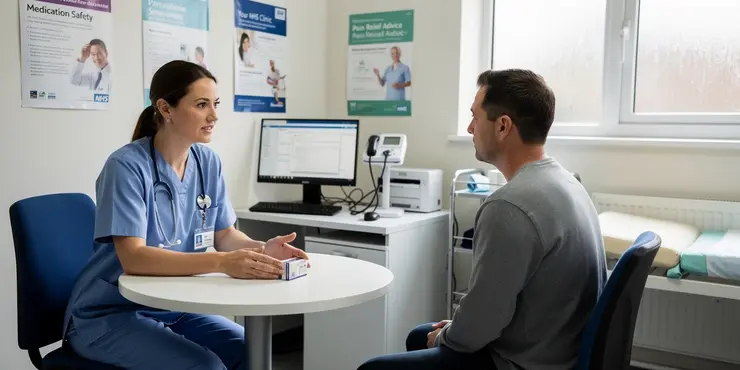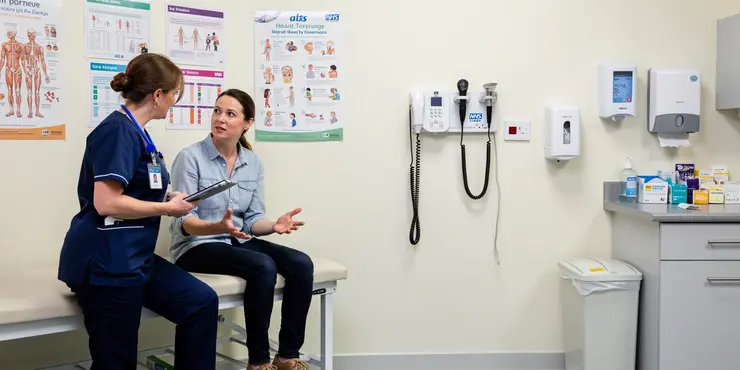
Find Help
More Items From Ergsy search
-

Is Paracetamol the same as Aspirin?
Relevance: 100%
-

Which one is better for headaches: Aspirin or Paracetamol?
Relevance: 90%
-

What is the difference between Aspirin, Paracetamol, and Ibuprofen?
Relevance: 89%
-
What is the difference between aspirin, paracetamol, and ibuprofen?
Relevance: 87%
-

What is Paracetamol?
Relevance: 63%
-

What is a common use of paracetamol?
Relevance: 61%
-

What is Paracetamol?
Relevance: 59%
-

Why might someone choose Paracetamol over NSAIDs?
Relevance: 58%
-

Does Paracetamol reduce inflammation?
Relevance: 58%
-

What is Aspirin?
Relevance: 54%
-

Is it safe to use aspirin to treat chickenpox symptoms?
Relevance: 52%
-
Should individuals with certain medical conditions avoid aspirin?
Relevance: 51%
-

Are Aspirin and Ibuprofen the same?
Relevance: 50%
-

Is paracetamol linked to autism?
Relevance: 49%
-

What are the side effects of Aspirin?
Relevance: 49%
-

What are the side effects of Paracetamol?
Relevance: 48%
-
Can aspirin interact with other medications?
Relevance: 47%
-

Can aspirin stop colorectal cancer?
Relevance: 47%
-

Is it safe to take Paracetamol with Ibuprofen?
Relevance: 47%
-

Can I take Aspirin and Ibuprofen together?
Relevance: 47%
-

Can Paracetamol be used in pregnant women?
Relevance: 46%
-

Can aspirin help in reducing the risk of strokes?
Relevance: 46%
-

Is aspirin recommended for everyone to prevent colorectal cancer?
Relevance: 46%
-
Is aspirin effective in preventing other types of cancer?
Relevance: 46%
-
Has the FDA approved aspirin for cancer prevention?
Relevance: 46%
-

Why is there concern about paracetamol and autism?
Relevance: 46%
-

How does aspirin work to reduce cancer risk?
Relevance: 45%
-

Has aspirin been proven to cure colorectal cancer?
Relevance: 45%
-

What dosage of aspirin is considered effective for cancer prevention?
Relevance: 44%
-

Which one is better for toothache: Ibuprofen or Paracetamol?
Relevance: 44%
-

What should I do if I'm considering aspirin for cancer prevention?
Relevance: 43%
-

Is there any scientific evidence that links paracetamol use to autism?
Relevance: 43%
-

Should people with a family history of colorectal cancer take aspirin?
Relevance: 43%
-

Is there any risk of using paracetamol outside of pregnancy with regard to autism?
Relevance: 43%
-

What should pregnant individuals consider when taking paracetamol?
Relevance: 42%
-
How long do studies suggest taking aspirin for cancer prevention?
Relevance: 42%
-

What do health organizations say about aspirin and cancer prevention?
Relevance: 42%
-
Is aspirin more effective for certain age groups in preventing colorectal cancer?
Relevance: 42%
-

Can I take ibuprofen and paracetamol together? - Common Health Questions | NHS
Relevance: 41%
-

What is Aspirin?
Relevance: 40%
Understanding Paracetamol and Aspirin
In the UK, paracetamol and aspirin are two commonly used pain relievers, often found in households across the country. While both medications are available over-the-counter and used to treat similar symptoms, they are distinct drugs with different chemical compositions and mechanisms of action.
The Chemical Composition and Mechanism of Action
Paracetamol, known as acetaminophen in some countries, is a medication used to relieve mild to moderate pain and reduce fever. It works primarily in the brain to decrease the production of prostaglandins, chemicals that promote inflammation, pain, and fever. Although its exact mechanism is not completely understood, it is believed that paracetamol blocks an enzyme involved in the production of prostaglandins, which helps alleviate pain and fever.
Aspirin, on the other hand, is a nonsteroidal anti-inflammatory drug (NSAID). It also works to reduce pain, fever, and inflammation, but through a different mechanism. Aspirin irreversibly inhibits cyclooxygenase (COX) enzymes, particularly COX-1 and COX-2, which are important for the synthesis of prostaglandins. This inhibition results in decreased production of prostaglandins, providing pain relief and reducing inflammation.
Uses and Benefits
Both paracetamol and aspirin are used to relieve common complaints, such as headaches, muscle aches, toothaches, and menstrual cramps. Additionally, each has unique benefits. Paracetamol is often preferred when seeking relief from fever and mild pain, as it generally has fewer gastrointestinal side effects compared to aspirin. It is also the painkiller of choice for people who need to avoid NSAIDs due to allergies or other contraindications.
Aspirin, in addition to its pain-relieving properties, has an anticoagulant effect. It is often recommended in low doses to help prevent heart attacks and strokes because it reduces the ability of the blood to clot. However, it is not typically used in children due to the risk of Reye's syndrome, a rare but serious condition.
Side Effects and Considerations
Paracetamol generally has a low incidence of side effects when used appropriately, but overdose can lead to severe liver damage, which is a critical consideration given its wide availability. It is crucial to adhere to the recommended dosage and avoid combining it with other medications containing paracetamol.
Aspirin, although effective, can cause gastrointestinal irritation or bleeding, and prolonged use may lead to peptic ulcers. It’s important to take aspirin with food to reduce stomach upset and to consult with a healthcare professional when considering its use for cardiovascular protection.
Conclusion
In conclusion, while both paracetamol and aspirin serve the purpose of alleviating pain and fever, they are not the same. Their different chemical structures and mechanisms of action mean they offer varied therapeutic benefits and considerations. Consulting with a healthcare professional is advisable to select the appropriate medication based on individual health needs and conditions.
Understanding Paracetamol and Aspirin
In the UK, lots of people use paracetamol and aspirin to help with pain. You can buy them easily, and many people have them at home. They help with similar problems, but they work differently because they are different drugs.
How They Work
Paracetamol, called acetaminophen in some places, helps with pain and fever. It works in your brain to stop certain chemicals that make you feel pain and get a fever. We are not sure exactly how it works, but it stops some of these chemicals, which helps you feel better.
Aspirin is another type of medicine that reduces pain, fever, and swelling. It works differently than paracetamol. Aspirin stops enzymes in your body from making the chemicals that cause pain and swelling. This helps you feel better by reducing these symptoms.
How They Help
Both paracetamol and aspirin can help with things like headaches, sore muscles, toothaches, and period cramps. Paracetamol is good for mild pain and fever, especially if you have stomach problems with aspirin. If you can't take aspirin because of allergies, paracetamol is a good choice.
Aspirin also helps stop blood clots, so doctors sometimes recommend it in small amounts for heart problems. But it is not safe for kids because it might cause a bad illness called Reye's syndrome.
Side Effects and Safety
Paracetamol is safe if you use it properly, but taking too much can hurt your liver. You should always follow the dose instructions and not mix it with other medicines that have paracetamol.
Aspirin can upset your stomach and sometimes cause bleeding. If you take it a lot, it might cause stomach problems like ulcers. It is better to take aspirin with food and talk to a doctor if you need it for your heart.
Conclusion
Paracetamol and aspirin both help with pain and fever, but they are not the same. They work differently and help in different ways. It's good to talk to a doctor to know which one is best for you.
Helpful Tips
Try using a pill organizer to keep track of your medication. Ask someone you trust to remind you about doses. There are apps that can help you remember to take your medicine too. Always ask a doctor or pharmacist if you're not sure about something!
Frequently Asked Questions
Is paracetamol the same as aspirin?
No, paracetamol and aspirin are different medications with different uses and properties.
What is the main difference between paracetamol and aspirin?
Paracetamol is mainly used as a pain reliever and fever reducer, while aspirin is additionally used as an anti-inflammatory and blood thinner.
Can I take paracetamol and aspirin together?
You should consult with a healthcare professional before taking paracetamol and aspirin together, as there may be risks involved, depending on individual health conditions.
What are common uses of paracetamol?
Paracetamol is commonly used to relieve mild to moderate pain and reduce fever.
What are common uses of aspirin?
Aspirin is used for pain relief, anti-inflammatory effects, reducing fever, and thinning the blood to prevent clots.
Is paracetamol an anti-inflammatory?
No, paracetamol does not have significant anti-inflammatory properties.
Is aspirin a blood thinner?
Yes, aspirin has blood-thinning properties and is often used to reduce the risk of heart attacks and strokes.
Which is safer, paracetamol or aspirin?
Both medications are generally safe when used as directed, but the safety depends on individual health conditions and potential side effects.
Can I take paracetamol if I'm allergic to aspirin?
Yes, paracetamol is a different medication and may be used by individuals who are allergic to aspirin, but it's important to consult with a healthcare provider.
Which medication is better for headaches, paracetamol or aspirin?
Both paracetamol and aspirin can relieve headaches, but the choice depends on individual response, other health conditions, and precautions.
Does paracetamol have any blood-thinning effects?
No, paracetamol does not have blood-thinning properties.
What are some side effects of aspirin?
Aspirin can cause stomach irritation, bleeding, allergic reactions, and in rare cases, Reye's syndrome in children and teens.
What are some side effects of paracetamol?
Paracetamol is generally well-tolerated, but overuse can cause liver damage and allergic reactions in some individuals.
Is aspirin suitable for children?
Aspirin is generally not recommended for children under 16 due to the risk of Reye's syndrome.
Is paracetamol suitable for children?
Yes, paracetamol is often used to relieve pain and reduce fever in children, using age-appropriate doses.
Can aspirin be used for heart attack prevention?
Yes, low-dose aspirin is sometimes used to prevent heart attacks and strokes, but it should only be used under medical supervision.
Does paracetamol reduce inflammation?
No, paracetamol is not effective for reducing inflammation.
Which is better for reducing fever, paracetamol or aspirin?
Both can reduce fever effectively, but individual responses may vary, and paracetamol is generally preferred for its lower risk of stomach irritation.
Can aspirin be used to treat arthritis?
Yes, aspirin can be used as an anti-inflammatory to help relieve symptoms of arthritis, but medical advice is important due to potential side effects.
Can paracetamol be used for arthritis pain?
Paracetamol can relieve mild arthritis pain but does not have anti-inflammatory effects, so it may not be as effective as other options for inflammation.
Are paracetamol and aspirin the same?
No, paracetamol and aspirin are not the same. They are two different medicines.
What does paracetamol do?
Paracetamol helps to ease pain and reduce a high temperature.
What does aspirin do?
Aspirin can also help with pain and fever, but it also helps to thin the blood.
Be careful
If you are not sure, ask a doctor or pharmacist. They can tell you which medicine is best for you.
Helpful tools
Use a picture dictionary or ask someone to read with you if you need help.
No, paracetamol and aspirin are not the same. They are different medicines. They have different uses and work in different ways.
How are paracetamol and aspirin different?
Paracetamol helps when you have pain or a fever. Aspirin also helps with pain and fever, but it does more. Aspirin can help with swelling and keeps your blood thin.
Can I take paracetamol and aspirin at the same time?
Can you take paracetamol and aspirin at the same time?
It is important to be careful when taking medicine.
If you need help, you can ask a doctor or a pharmacist.
You can also look for information on the medicine box or package.
Using a pill organizer can help you keep track of your medicines.
It's always a good idea to talk to an adult for help.
Talk to a doctor before taking paracetamol and aspirin at the same time. It might not be safe for everyone.
What is paracetamol used for?
Paracetamol is a medicine.
People use it when they:
- Have a headache.
- Feel pain in their body, like a sore arm or leg.
- Have a fever (when they feel hot).
Paracetamol helps make the pain or fever go away.
If you need help reading this, you can ask someone to read it with you. You can also use tools that read words out loud.
Paracetamol helps when you are in pain or have a fever. It makes you feel better.
What is aspirin used for?
Aspirin helps with pain and swelling, lowers fever, and makes blood thinner to stop clots. It can be helpful to use pictures or a story to explain how aspirin works. Reading out loud or using a read-aloud tool might also make it easier to understand.
Does paracetamol help with swelling?
Paracetamol is a medicine people take when they have pain or a fever. It does not help with swelling. Swelling means the area is red, warm, or bigger than normal.
If you have pain and swelling, you might need a different medicine called an "anti-inflammatory." Ask an adult or a doctor to help you choose the right medicine.
Remember:
- Paracetamol is for pain and fever.
- It does not reduce swelling.
- Ask for help if you're not sure what medicine to take.
No, paracetamol does not help reduce swelling.
Does aspirin make your blood thinner?
Yes, aspirin can make your blood thinner. It helps to stop heart attacks and strokes.
What is safer to take, paracetamol or aspirin?
Paracetamol and aspirin are both medicines. They can help if you have pain or a fever.
But, it's important to know which one is safer for you.
You can ask a doctor or a nurse to help you choose.
If you are not sure, you can also:
- Read the label on the medicine bottle.
- Ask an adult to help you understand.
Both medicines are safe if you use them the right way. But they might not be safe for everyone. It depends on your health and if the medicine has any side effects.
Tools to help: - Ask a doctor or pharmacist if you are not sure. - Read the medicine label carefully. - Use apps or timers to remind you when to take your medicine.
Can I take paracetamol if I'm allergic to aspirin?
If you are allergic to aspirin, it is usually safe to take paracetamol. Paracetamol is a different medicine. Always check with a doctor or pharmacist if you are not sure.
Here are some tips to help understand:
- Ask for help: If you don't understand, ask someone you trust.
- Use simple words: Make sure the words are easy to read.
- Read slowly: Take your time to read each word.
Paracetamol is a different kind of medicine. If you are allergic to aspirin, you might be able to take paracetamol. But you should always talk to a doctor or nurse first.
Which medicine is better for headaches, paracetamol or aspirin?
If you have a headache, you might think about taking medicine to feel better. Two common medicines for headaches are paracetamol and aspirin.
Paracetamol: This medicine can help with pain like headaches. It is gentle on the stomach.
Aspirin: This medicine can also help with pain. It can help with swelling too. But it might upset your stomach.
If you are not sure which medicine to take, you can ask a grown-up or a doctor for help. They can tell you what is best for you.
Tip: You can use picture charts to remember which medicine you can take. Always read the label or ask someone you trust.
Paracetamol and aspirin can both help with headaches. Which one you use depends on how your body reacts to them and any other health issues you might have.
Does paracetamol make your blood thinner?
No, paracetamol does not make your blood thinner.
What can aspirin do to you?
Aspirin can help when you are hurt or sick. But, it can also cause problems for some people. These problems are called "side effects." It's important to know what these are.
Here are some things that might happen if you take aspirin:
- Your tummy might hurt.
- You might feel sick or throw up.
- You could get a headache.
- Your ears might make a ringing sound.
If you are worried, always ask an adult or a doctor. They can help you. It's good to use things like a timer or reminder to track when you take medicine. Drawing pictures or using apps can also help you understand your medicines better.
Aspirin can upset your stomach and make it sore. It can also cause bleeding and allergies. Sometimes, it can be dangerous for kids and teenagers because of something called Reye's syndrome.
What can happen if you take paracetamol?
Paracetamol can help when you are in pain or have a fever. But sometimes it might cause other things to happen in your body, like:
- Tummy ache
- Feeling sick
- Feeling dizzy
- Skin rash
If you feel any of these, tell an adult or a doctor. They can help you feel better.
It helps to read with an adult or use tools like audio books or picture books. They can make it easier to understand.
Paracetamol is usually safe to take. But taking too much can hurt your liver. Some people might have an allergy to it.
Can children take aspirin?
Aspirin is a medicine. Children under 16 should not take it. It can make them very sick with something called Reye's syndrome.
Can children take paracetamol?
Yes, children can take paracetamol, but you need to give the right amount. Paracetamol helps if they feel pain or have a fever.
Check with a doctor: Always talk to your doctor or pharmacist before giving paracetamol to a child.
Read the label: Look at the packet to find out how much to give. It tells you how much is safe for your child's age and weight.
Use a measuring spoon or syringe: Use a special spoon or a plastic syringe to give the right amount of paracetamol.
Set a timer: You can use a clock or a timer to make sure you do not give another dose too soon. Follow the time on the packet.
If you are not sure about anything, ask a doctor or pharmacist for help.
Yes, you can give paracetamol to children to help with pain and make a fever go down. Make sure to give the right amount for their age.
Can aspirin help stop a heart attack?
Aspirin is a medicine. Some people take it to help stop heart attacks. But it's not for everyone. Talk to your doctor first.
Here are some tips:
- Ask your doctor if aspirin is good for you.
- If your doctor says yes, take the right amount.
- Ask your family or friends to help you remember.
If you need help reading, you can:
- Ask someone to read it to you.
- Use audiobooks or apps that read text aloud.
- Look for videos that explain about aspirin and heart attacks.
Yes, low-dose aspirin can help stop heart attacks and strokes. But you should only take it if a doctor says it is okay.
Tips:
- Always talk to your doctor before taking aspirin.
- Use tools like medicine organizers to remember when to take it.
Does paracetamol help with swelling?
Paracetamol is a medicine. It helps to stop pain and can bring down a fever. But, it does not help with swelling or inflammation.
If you need help remembering this, you can:
- Draw a picture of a thermometer or fever for a fever.
- Draw a line through a swollen area to show paracetamol does not help with swelling.
If you're unsure, ask a grown-up or a doctor to explain.
No, paracetamol does not help with swelling or inflammation.
Which medicine is better for lowering a fever: paracetamol or aspirin?
Both medicines can help lower a fever. However, some people might respond differently. Paracetamol is usually chosen because it is less likely to upset your stomach.
Can aspirin help with arthritis?
Arthritis makes your joints hurt and swell. Aspirin is a kind of medicine that people sometimes take when they have pain or swelling.
If you have arthritis, talk to your doctor before taking aspirin. They can tell you if it's a good idea for you.
Using pictures or talking to someone can also help you understand and remember information better.
Aspirin can help with swelling and pain from arthritis. But it's important to talk to a doctor because aspirin can sometimes cause problems.
Can I take paracetamol for joint pain?
Paracetamol can help with pain in your joints, like arthritis. It can make the pain feel better.
Always ask a grown-up, like a doctor or a pharmacist, before taking medicine. They can make sure it is safe for you.
Here are some tips to help:
- Read the medicine bottle carefully.
- Take the right amount of medicine.
- Use a timer to remember when to take it.
Paracetamol can help with small pains from arthritis. But it does not help with swelling or inflammation. Other medicines might work better for swelling.
Useful Links
This website offers general information and is not a substitute for professional advice.
Always seek guidance from qualified professionals.
If you have any medical concerns or need urgent help, contact a healthcare professional or emergency services immediately.
Some of this content was generated with AI assistance. We’ve done our best to keep it accurate, helpful, and human-friendly.
- Ergsy carfully checks the information in the videos we provide here.
- Videos shown by Youtube after a video has completed, have NOT been reviewed by ERGSY.
- To view, click the arrow in centre of video.
- Most of the videos you find here will have subtitles and/or closed captions available.
- You may need to turn these on, and choose your preferred language.
- Go to the video you'd like to watch.
- If closed captions (CC) are available, settings will be visible on the bottom right of the video player.
- To turn on Captions, click settings .
- To turn off Captions, click settings again.
More Items From Ergsy search
-

Is Paracetamol the same as Aspirin?
Relevance: 100%
-

Which one is better for headaches: Aspirin or Paracetamol?
Relevance: 90%
-

What is the difference between Aspirin, Paracetamol, and Ibuprofen?
Relevance: 89%
-
What is the difference between aspirin, paracetamol, and ibuprofen?
Relevance: 87%
-

What is Paracetamol?
Relevance: 63%
-

What is a common use of paracetamol?
Relevance: 61%
-

What is Paracetamol?
Relevance: 59%
-

Why might someone choose Paracetamol over NSAIDs?
Relevance: 58%
-

Does Paracetamol reduce inflammation?
Relevance: 58%
-

What is Aspirin?
Relevance: 54%
-

Is it safe to use aspirin to treat chickenpox symptoms?
Relevance: 52%
-
Should individuals with certain medical conditions avoid aspirin?
Relevance: 51%
-

Are Aspirin and Ibuprofen the same?
Relevance: 50%
-

Is paracetamol linked to autism?
Relevance: 49%
-

What are the side effects of Aspirin?
Relevance: 49%
-

What are the side effects of Paracetamol?
Relevance: 48%
-
Can aspirin interact with other medications?
Relevance: 47%
-

Can aspirin stop colorectal cancer?
Relevance: 47%
-

Is it safe to take Paracetamol with Ibuprofen?
Relevance: 47%
-

Can I take Aspirin and Ibuprofen together?
Relevance: 47%
-

Can Paracetamol be used in pregnant women?
Relevance: 46%
-

Can aspirin help in reducing the risk of strokes?
Relevance: 46%
-

Is aspirin recommended for everyone to prevent colorectal cancer?
Relevance: 46%
-
Is aspirin effective in preventing other types of cancer?
Relevance: 46%
-
Has the FDA approved aspirin for cancer prevention?
Relevance: 46%
-

Why is there concern about paracetamol and autism?
Relevance: 46%
-

How does aspirin work to reduce cancer risk?
Relevance: 45%
-

Has aspirin been proven to cure colorectal cancer?
Relevance: 45%
-

What dosage of aspirin is considered effective for cancer prevention?
Relevance: 44%
-

Which one is better for toothache: Ibuprofen or Paracetamol?
Relevance: 44%
-

What should I do if I'm considering aspirin for cancer prevention?
Relevance: 43%
-

Is there any scientific evidence that links paracetamol use to autism?
Relevance: 43%
-

Should people with a family history of colorectal cancer take aspirin?
Relevance: 43%
-

Is there any risk of using paracetamol outside of pregnancy with regard to autism?
Relevance: 43%
-

What should pregnant individuals consider when taking paracetamol?
Relevance: 42%
-
How long do studies suggest taking aspirin for cancer prevention?
Relevance: 42%
-

What do health organizations say about aspirin and cancer prevention?
Relevance: 42%
-
Is aspirin more effective for certain age groups in preventing colorectal cancer?
Relevance: 42%
-

Can I take ibuprofen and paracetamol together? - Common Health Questions | NHS
Relevance: 41%
-

What is Aspirin?
Relevance: 40%


